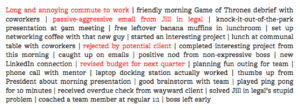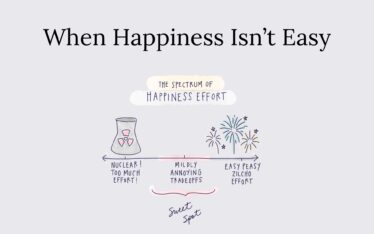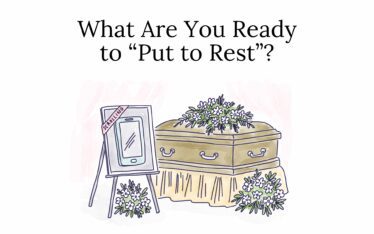And sometimes work involves hard work.
Happiness equals reality minus expectations. This beautifully simple definition of happiness is one I keep coming back to whenever I’m anything less than ecstatic (so, often).
When we’re bummed by our work, it’s often because we’re comparing our day-to-day experience (reality) to the fantasy (expectations) we let Confucius confuse us into believing was possible with his “choose a job you love, and you will never have to work a day in your life” quote. Guess what? The reality of our jobs often does fall short of the expectations built around that quote on our coffee mugs, and we tend to have a hard time handling it.
What does this tend to look like?
Many suffer from delusions of grandeur, which sounds a lot like “I thought they’d see that I was special by now” and “I’ve been here for 15 minutes and I haven’t been promoted yet”. These people expect more than any kind of reality can reasonably deliver, don’t get what they’re expecting right on cue, and then wonder why they’re unhappy.
Some turn their reality-expectation gaps inward, in colossal displays of self-judgment that sound like “I thought I wanted to be a “insert job title here” but maybe I’m just not cut out for it” and “I’m just not as good as I thought I was.” Not winning at what you thought the job would entail isn’t an indictment of your character and doesn’t make you a failure– it means that your expectations were flawed.
Others get defiant at the system that requires small doses of blood, sweat and tears to be successful at work and stage self-defeating revolts that sound like “screw them!” and looks like seven jobs in a three-year period with a lot of wondering why Work Sucks All The Time, Every Single Time. Expecting the ‘next best thing’ job to be some sort of panacea is a recipe for happiness disaster.
I’m all about choosing work that makes your soul sing, and I’m also about living in a place called reality. Work — even if it’s the thing you were put on the planet to do, the thing you’re better at than the chump sitting next to you in the interview waiting room, the thing you’re terrifically talented at — often involves effort that extends beyond one’s comfort zone. It often involves tasks that don’t spark your passion. It often involves people that piss you off.
It’s possible for work to be simultaneously fulfilling and frustrating, meaningful and maddening, enjoyable and elusive. It comes down to the right ratio of joy to annoyance.
What are reasonable comfort zone expectations at work?
Positivity ratios (the ratio of our good to bad feelings) ultimately predict how happy we’re going to be. Psychologist Barbara Frederickson tells us about the uber-essential 3-to-1 ratio, meaning that we need to have three positive emotions for every negative one in order to thrive. When it comes to work, Richard Conniff quotes research (in his immensely readable book) that in business meetings we need five good interactions for every one bad interaction (if we want our work team to be profitable and successful, which no one doesn’t want).
Ed Diener (now I’m just trying to impress you with three different fact sources), who is actually and fantastically nicknamed “Dr. Happiness”, says that bosses need to provide four positive interactions for every one negative interaction with their employees. So what to do with all this science? Let’s aim for a healthy 4-to-1 ratio of liking work vs. not liking work. It might look like this:

Some days might serve up a perfect 4:1 ratio (or better), and some weeks might be disasters while others fantastically even out the scales. Some days having to work extra hard to close a deal or collaborate with IT might weigh heavier on your happiness sensibilities than other times when you’re crushing the crap out of every 9-5 day. Being an entrepreneur, for example, can open up endless doors of fulfilling delight, and yet suck the soul when it comes to the things most people didn’t go into business to do (like spending inordinate amounts of time doing taxes, figuring out where Mason is at 5:30 p.m. for his 5 p.m. shift, and managing enterprise-level anti-viral software accounts).
Adopting the mindset that work sometimes takes work– and managing your expectations around that notion– might save you a lot of angst along the career path you’re always in the midst of forging until the day you’ve Gone Fishing forever. If you take the slightly harsh sting out of Haruki Murakami’s famous line, “Pain is inevitable, suffering is optional,” it provides a healthy way of looking at the way we work. It’s okay to expect a bit of pain (in the form of annoyances, mundane tasks, in-over-your-head-at-times hard, overtime, failure and the vulnerability that goes along with it) and be confident and clear when we need to stop the suffering part.
Staying in a job that’s horrible is never an option– I’ve been there, done that, and want to help you never have to do that. Expect great things from work, from yourself, from your boss, from your team, and from your company. Just don’t forget to expect a little reality sprinkled in-between the greatness.







